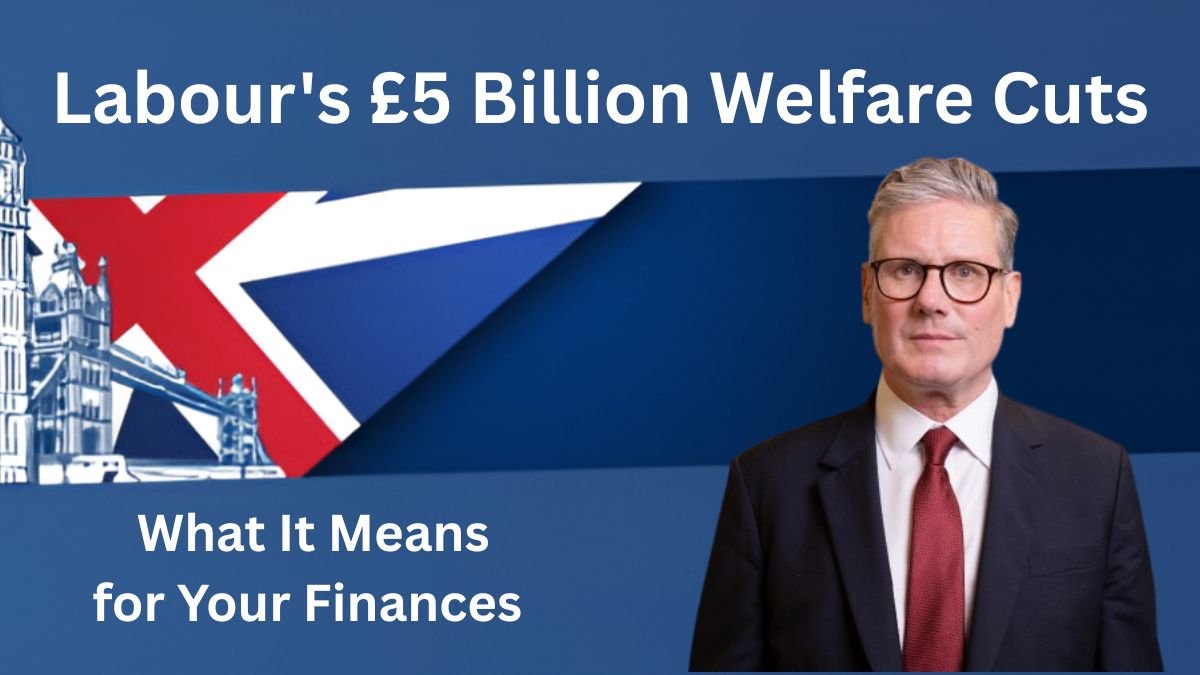The £5 billion welfare cut plan announced by the new Labour government in the UK has sparked political, social and economic debate across the country. If you are receiving any government benefits or expect to in the future, this article is a must-read. We’ll explain what the plan is, who will be most affected, and how you can prepare yourself.
Why are such welfare cuts taking place?
According to the Labour Party, the move is meant to get the escalating debt of the country under heel and put the welfare system on a financially viable position. They maintain that a reduction in these cuts will save money which will be invested in vitals like NHS, education and green power.
However, their critics add that this decision will have a direct impact on the poorer, more disabled and more needy citizens of the country and will ultimately complicate their lives.
Which benefits will be affected?
The key government benefits that will be cut under the new Labour government plan are:
- Personal Independence Payment (PIP)
The eligibility test for PIP will now be more stringent.
It will be more difficult to prove mental health and mobility problems in particular.
It is estimated that 1.2 million people could be excluded from PIP.
A person could suffer a financial loss of up to £4,000–£6,000 each year.
- Changes to Universal Credit
Partially disabled people will now be included in job search requirements.
This will force not less than 300,000 people to fall below the poverty line and this is likely to include an estimated 50,000 children.
- Support and Employment Allowance (ESA)
The ‘work-related activity component’ under ESA will be removed for new applicants.
This will see beneficiaries lose £29.05 a week – a loss of more than £1,500 a year.
Who will be most affected?
The scheme will have the biggest impact on people who are already in vulnerable social and economic positions:
- Disabled adults and children, particularly those with mental or temporary illnesses.
- Single parents and home carers, who are now expected to work more.
- Young people under 35 who rely on government schemes for mental health support.
- Low-income families who supplement their income with Universal Credit.
- According to a Bloomberg report, the country’s poverty rate could rise, undoing the progress made over the past few years.
This will force not less than 300,000 people to fall below the poverty line and this is likely to include an estimated 50,000 children.
- Support and Employment Allowance (ESA)According to them:
- The scheme will be implemented gradually, so that the affected people have time to adjust.
- It will also have some “safeguards” so that the most needy are not completely deprived of help.
- The money saved will be used in NHS, education and green projects.
Opposition from critics and NGOs
While the government’s arguments may be economically correct to some extent, human rights organizations, welfare experts and social workers say that:
- Inappropriate transparency
The exact amounts of the budget and the review of the possible effects (OBR report) has not been released yet, so some concern over the responsibility of the government can be raised. - Human impact
This cut can negatively affect the lifestyle of the disabled, sick and vulnerable families. Mental stress, health problems and homelessness may increase. - Pressure on public services
As people lose welfare support, pressure will increase on social welfare services such as mental health clinics, charities and local councils.
Real stories: When government support is a lifeline
Sarah (age 28)
Sarah has multiple sclerosis. She relies on PIP and Universal Credit. Under the new testing system she could be excluded from PIP, leaving her without access to essentials such as physiotherapy, wheelchair access and stair lifts.
James (single father)
James works part-time in retail and brings up his two children with the help of ESA. From next year he will receive £30 less a week, which covers his heating bills today.
Fatima (postgraduate degree)
Fatima is a person with extreme anxiety. She is afraid that she will not be able to satisfy a new mental health eligibility and, therefore, will not only have no support anymore, but will also become incapable of applying to a job.
How to prepare? Get financially and mentally strong
1. Double check your eligibility
Use Turn2us or gov.uk’s Benefits Calculator to find out what you’re eligible for under the new rules.
2. Meet an adviser
Contact Citizens Advice, Disability Rights UK or your nearest welfare office. They’ll give you information on appeals, support and other options.
3. Start budgeting
The small costs can be reduced, which may result in large savings. Help can be achieved with such apps as Moneyhub, Emma, or Yolt.
4. Find local support
- Council hardship grants
- Food bank referrals
- Utility bill assistance
- Mental health networks
5. Understand your right to appeal
If your benefits are reduced, you can challenge it through Mandatory Reconsideration. Be aware of the documents required and deadlines.
Options and additional resources
If your support is reduced, these options may help:
- Housing Benefit, especially if you live in supported housing.
- Carer’s Allowance, if you care for someone.
- Disabled Facilities Grants, for home modifications.
- Local Welfare Assistance Schemes, available at council level.
- Websites such as Turn2us and Entitledto provide eligibility checkers and databases.
Conclusion:
Although the cuts in terms of the government vision is to create a financially sounding plan to the future, the £5 billion cuts will considerably affect the most vulnerable members of the society on a short run basis. We should all make sure to be informed, get the correct information and speak up where the case arises. When you are a victim or have a loved one who might be impacted by its changes, now is the time to prepare, support, and find resolutions.
FAQs
1. What are Labour’s £5 billion welfare cuts?
A. Labour’s welfare cuts refer to a new fiscal plan under which the government will reduce spending on welfare benefits by £5 billion. The plan includes changes to eligibility, benefit amounts, and the structure of major support schemes like PIP, Universal Credit, and ESA.
2. Why is the Labour government cutting welfare spending?
A. The Labour government says the cuts are necessary to manage national debt, reduce public spending, and reallocate funds to essential services such as the NHS, education, and green infrastructure projects.
3. When will these changes be implemented?
A. The implementation of the cuts will be phased in gradually, with full rollout expected by 2029 to allow households time to adjust and appeal if necessary.
4. Can these cuts be challenged or appealed?
A. Yes. Individuals who lose or see a reduction in benefits can request a Mandatory Reconsideration and, if denied again, file a formal appeal through a tribunal process.
5. How many people could lose eligibility or income?
A. Up to 1.2 million people may lose their PIP eligibility
An estimated 250,000 people, including 50,000 children, could be pushed into poverty
New ESA claimants may lose £29.05 per week

